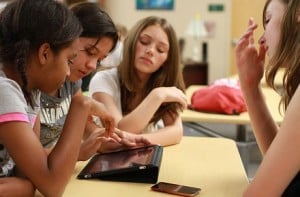The tablet classroom
iPads: coming soon to a school (or zoo) near you
Photo by NASA Goddard Photo and Video
Share

All incoming first-years enrolled in full-time post-secondary programs at Collège Boréal in Sudbury, Ont will receive iPads for the start of the 2012 school year. The Northern Ontario School of Medicine, also in Sudbury, handed out iPads to each student starting in September 2010.
It’s easy to see the appeal. Writing notes by hand is a pain. You have to print lecture slides out ahead of time, transport them, and then (if your penmanship is anything like mine) scribble all over them. That’s why many of us bring laptops.
But laptops have drawbacks too. Unlike a good-old-fashioned spiral bound notebook, you have to worry about the battery life. Tablets like the iPad are—in the words of Hannah Montana—the best of both worlds. They’re small, easy to transport, and have longer-lasting batteries.
For students at Boréal, iPads will also allow direct access to content from the Tembec Resource Centre, which includes over 10,000 digitized documents, plus other educational applications. (Presumably, the ‘educational’ distinction rules out things like the toilet paper rolling app.)
The iPad isn’t just being embraced because of its convenience; the initiative also supports Collège Boréal’s environmental efforts. A semester’s worth of course notes is a lot of paper. If a few more schools embraced the iPad, it could save a small forest.
Another reason there’s such a big push to get an iPad into everyone’s hands is that they supposedly boost literacy and test scores. One study at Abilene Christian University in Texas showed that iPad-using students scored 25 per cent higher on a test. Another showed that the iPad’s portability allows spur of the moment research and discussion that isn’t otherwise possible.
It’s not just university students getting in on the iPad action: educators in Auburn, Maine, started instructing 266 kindergarteners using the tablet this fall. Personally, I wouldn’t trust a kid who’s still in the safety-scissor stage with a piece of $500 tech, but either way, Apple’s big push for digital classrooms, by allowing teachers to publish books and create apps, appears to be working.
Even orangutans at the Toronto Zoo may soon get tablets to help stimulate their brains and prevent the boredom of captivity. Orangutan Outreach, a conservation group leading the ‘Apps for Apes’ program, told Maclean’s that the Toronto Zoo is at the “top of the list” for donated iPads.
Yes, that’s right—a monkey in the Toronto Zoo could soon be beating your high score on Tetris.
Not everyone is convinced about the tablet’s educational worth. “iPads are marvellous tools to engage kids, but then the novelty wears off and you get into hard-core issues of teaching and learning,” Larry Cuban, a Stanford University professor emeritus, told The New York Times.
There are also fears that students may become too ‘reliant’ on the iPad, with instantly accessible glossaries and flashcards acting as crutches.
Of course, when the Internet came out, similar arguments were made. In reality, the convenience of the internet means that students can spend less time searching through library shelves, and more time studying and applying the information they find.
That’s why I believe digital tablets hold endless possibilities for the classroom. In fact, I just thought of another: When your professor says, “I’m not going to test you on this—-it’s just for your own information,” you could boot up Tetris on your iPad and show that Orangutan who’s boss.
Scott Dobson-Mitchell studies at the University of Waterloo. Follow @ScottyDobson on Twitter.